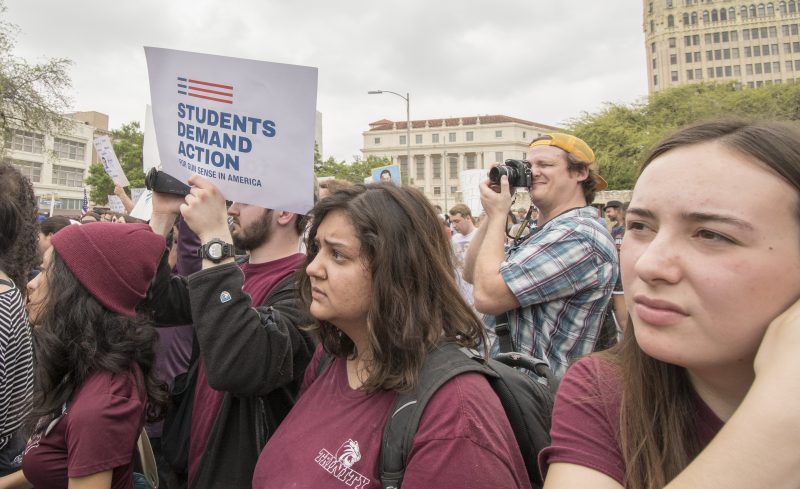It began like a normal day. I was in seventh grade at the time — 12 years old — and had stayed up the night before studying for a geography exam. The periods came: first, second, third and fourth. At the end of fourth period, choir, my principal came over the loudspeaker, calmly announcing that the school was going into a code red.
Drills like these were commonplace. Sometimes, code reds were announced if the drug dog was coming to sniff out some rogue eighth grader’s weed stash in his locker. Nothing was really out of the ordinary. My teacher calmly got up, locked the door with the tool she kept in the box nearby, turned off the lights, and we crowded together in the corner of the room in silence.
These were the provisions of the code red drill. Nobody could come in or out of the classroom. A half-hour into the lock-down, students got antsy. We began messing with markers, making swords or drawing pictures on discarded papers.
Miss Kemp, our teacher, remained silent, scrolling on her laptop, her face illuminated by the blue light. I now know that she was reading the news. She knew exactly what was happening. An hour into the lockdown, students began receiving text messages from their parents about what happened.
On Jan. 5, 2011 at 12:45 p.m., Robert Butler Jr. walked into the Millard South High School, two miles away from where my classmates and I were, and opened fire. He was deliberate, set on taking the life of Assistant Principal Vickie Kasper, who had suspended him earlier that day for a behavioral offense. He then got into his car, drove to a park down the road, and turned the gun on himself.
In total, all 20,000 students in the Millard Public School District were placed under lockdown. We were locked in that choir classroom for an hour and a half, not knowing what was happening a short distance away.
Some students’ siblings were in the school when the shooting happened. They sat in fear for the rest of the day, shrouded in mystery as the police continued investigating, not knowing if their family members were safe.
In the aftermath, the district tried to figure out the best way to keep us safe. Clear backpacks, uniforms, metal detectors at football games were all debated. We came together as a community to help Millard South heal. Then, after a while, we simply moved on.
I was too young to understand the structural changes that happened in my district. We would talk about the South Shooting, as it came to be known, after other big shootings. We would talk about the experience of sitting and waiting for any information in silence for hours.
My freshman year, news of the Sandy Hook shooting spread while I was at school. We talked about it then. Again, we debated for a while and nothing tangible happened.
I still think about my community’s experience with school shootings each time I hear about another terrible tragedy. I think back to being crouched in silence with my classmates; I think about my quiet, Nebraskan community mourning; I think about those students who witnessed the shooting directly.
My community’s experience does not exist in a vacuum. So many students my age have witnessed unthinkable horrors — the fear that your school will be next. This is why I felt the need to tell my community’s story. This very personal encounter with gun violence is why I marched in the March for Our Lives this past weekend.
I never want another community to experience what mine did — what the Stoneman Douglas community did, what the Sandy Hook community did, what the Columbine community did, what the Virginia Tech community did — and so many hundreds of others, including the black and brown communities whose names are never uttered in this debate.
These are the communities most at risk. We’re saying that enough is enough. Your loudest voice is your vote. The generation born after Columbine is starting to come to voting age, and we can now take tangible steps to make our voices heard.
Contact Trinity Progressives for more information on how you can get registered to vote or to get connected with the students organizing for gun reform in the larger San Antonio community. The best way to make change is to make change together.






